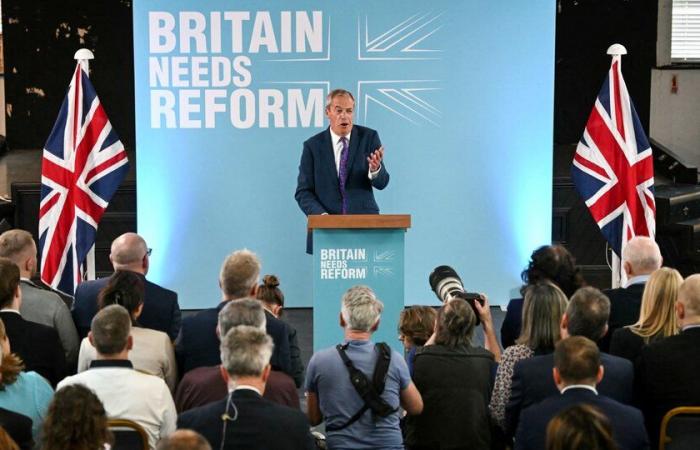
From London
He is the wild card of British politics, the “outsider” who tries to break the political alternation that has dominated the United Kingdom since the founding of the Labor Party in 1900 (86 years of Conservative governments, 31 of Labor).
With different political structures based on their charisma, the far-right Nigel Farage In the recent past, he achieved something that seemed impossible: for the United Kingdom to break with the European Union. He now seeks to move the chips in the July 4 elections that all polls have been showing as won by Labor with a large majority.
The match– shell that holds it, Reform UK, founded in 2021, reached nine percent in the polls in a couple of years. Nigel Farage’s irrepressible rise has continued ever since. Last week a poll put him ahead of the conservatives.
In the average of polls over the last seven days, he is third with 15 percent, six behind the Conservatives and ahead of the Liberal Democrats and Greens. Labor is a astronomical distance ahead of everyone: 41 percent. The big question is whether Farage’s party can continue to score points and at whose expense.
A story of surprises
At first it would seem impossible, but history advises caution with futurology. When Farage founded UKIP (United Kingdom Independence Party) in 1993, his goal was for the United Kingdom to leave the European Union. Considered an eccentric charlatan, better known for his pints of beer and his huge laugh in photos than for his political plans, Farage was taking votes from the conservativeswon a seat in the European Parliament in 1999 and performed well in municipal and European elections over the next 15 years.
Harassed by this presence to his right, the then Conservative Prime Minister David Cameron promised he would call an EU referendum if his party won the 2015 election with a majority. The polls of the time allowed him to make that promise with the conviction that it was practically impossible to obtain a comfortable victory after five years of very harsh austerity.
Luck was on Farage’s side. A symbol of pyrrhic victory, Cameron won a surprise majority of his own in the House of Commons that came with a poisoned gift: the obligation to fulfill his referendum promise. The rest is history. Farage’s message divided Conservatives and reached audiences who thought the UK’s problems were due to its EU membership. In 2016, the British voted to end their more than 40-year relationship with the European bloc.
UK Reform
Farage runs his matches as if they were his private company. In 2016 he resigned as leader of UKIP, completing his objective with victory in the referendum. UKIP today is a non-existent shadow, seeking to survive by allying itself with openly fascist parties, such as the British National Party. In 2021 Farage launched Reform UK with a strong campaign against the pandemic confinement and the ties that still exist with the EU.
The match began to grow parallel to the crisis of the conservatives that since 2022 they have had three prime ministers: Boris Johnson, Liz Truss and Rishi Sunak. When Sunak played the lottery on May 20 by calling an early election, Farage said he would not stand as a candidate. He was half his time in the United States, too busy forging alliances and business deals with Donald Trump’s Republicans to think about an election that seemed decided.
A few weeks later he carried out an internal party coup because, seeing the progress of the campaign, he realized that he could finally win a seat in the House of Commons. Without much thought he removed from the party leadership the same politician he had nominated for the position: the lackluster Richard Tice.
The British Parliament is an outstanding debt in his political career. Despite his photogenicity, Farage stood for MP eight times and lost each time. Ironies of fate: he only got one seat in the European parliament. Elected in 1999, he was re-elected in 2004, 2009 and 2014 and retired, to the relief of the vast majority of MEPs, in 2020, when Brexit was completed.
Aware of his previous failures, Farage chose to be a candidate in the electoral area most favorable to his figure. “Clacton on Sea” is a coastal district with many retirees and nostalgic for imperial gloryl. In 2014, a conservative renegade who had joined the ranks of UKIP won a seat in the British Parliament for the first time for Farage’s party. He now wants to realize his own dream. According to the polls, they are head to head with the conservatives who regained the seat in 2017.
Could it be a British Milei?
The British electorate is much more skeptical, less participatory and passionate than the Argentinean. The indirect electoral system also does not favor the emergence of third forces. The British do not elect the prime minister: they vote for the deputy who will represent them in parliament.
The party that obtains the most deputies in the House of Commons is the one that elects its party leader as prime minister. There is also no proportional representation in the 650 electoral areas. The candidate who wins the local election in his or her constituency, even by one vote, wins the seat.
Conservatives fear that this system that favored them for so long will work against them. In many areas, the Farage vote will divide the conservative vote, favoring parties that want to displace the Tories, be it the Liberal Democrats in the south or the Labor Party in the north. One of this week’s polls anticipates that the conservatives could be decimated on July 4 and go from the current 344 deputies to around 75.
Farage has openly acknowledged that he is not betting on winning. “We are a very new party. But we are very excited about the support we get from 18-24 year olds. This is the first step towards the election in 2029. What we want is to be the real opposition of the Labor party,” he said at the launch of the manifesto on Monday.
The appeal to that young vote seems to be the wet dream of many (ultra) right-wing parties. In the case of Farage, field research on her electoral base shows that her followers are mostly women or over 70 years old with patriotic and imperial longings.
One thing works in his favor. The UK has many challenges in terms of essential public services such as health and education or due to the increase in poverty, inequality, housing and lack of opportunities. Labor at the moment only talks about fiscal rectitude. Five years of government can be an eternity. If Sir Keir Starmer disappoints his electorate with a lukewarm programme, it is impossible to predict his further impact on the global instability we are experiencing. Milei thrived on this type of disappointment. Labor should take this into account if it does not want to give the UK and the world a Farage surprise in five years.





